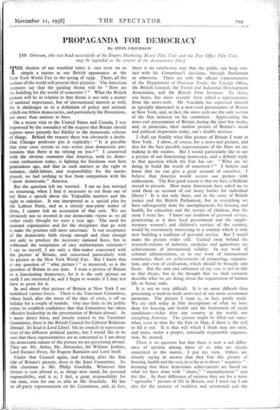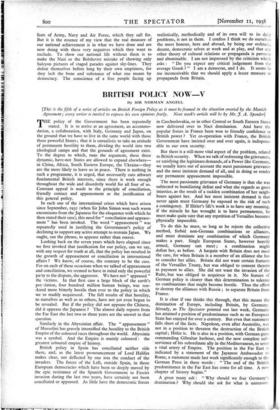PROPAGANDA FOR DEMOCRACY
By JOHN GRIERSON [Mr. Grierson, who was head successively of the Empire Marketing Board Film Unit and the Post Office Fihn Unit, may be regarded as the creator of the documentary film.] THE shadow of our troubled times is cast even on so simple a matter as our British appearance at the New York World Fair in the spring of 1939. There, all the nations of the world will present their pictures. The American sponsors say that the guiding theme will be "How are we building for the world of tomorrow ? " What the British picture will be in relation to that theme is not only a matter of national importance, but of international interest as well, for it challenges us to a definition of policy and attitude which our fellow democracies, and particularly the Dominions, are more than anxious to have.
On a recent visit to the United States and Canada, I was impressed by the constancy of the request that Britain should express more patently her fidelity to the democratic scheme of things. Behind the request there was obviously a doubt. One Chicago professor put it explicitly: "Is it possible that your caste system so cuts across your democratic pre-.
tensions that there is no relying on you ? " I countered with the obvious comment that America, with its demo- cratic enthusiasm today, is fighting for freedoms won here generations ago, and that in such matters as the right to unionise, child-labour, and responsibility for the unem- ployed, we had nothing to fear from comparison with his "more democratic" America.
But the question left me worried. I am no less worried on returning, when I find it necessary to cut from one of my films a speech about the Tolpuddle martyrs and the right to unionise. It was interpreted as a special plea for the Labour Party, and as a strictly non-party maker of films, I cannot risk an accusation of that sort. We are obviously not so assured in our democratic regime as we all rather easily thought we were a year ago. The need for national organisation and for the disciplines that go with it make the position still more uncertain. Is our acceptance of the democratic faith strong enough and clear enough not only to produce the necessary national force, but to withstand the temptation of easy authoritarian solutions ? I say to myself, I am only a film-maker concerned with the picture of Britain, and concerned particularly with its picture at the New York World Fair. But I know that a3 my question of "what picture ? " is answered, so is the question of Britain in our time. I want a picture of Britain as a functioning democracy, for it is the only picture on earth I am interested in, and I begin to wonder if I may not have to press for it.
In and about that picture of Britain at New York I see mobilised various forces. There is the Vansittart Committee, whose head, after the stress of the days of crisis, is off on holiday for a couple of months. One sees little in the public prints to establish confidence that that Committee has taken effective leadership in the presentation of Britain abroad. As a more direct force, and loosely related to the Vansittart Committee, there is the British Council for Cultural Relations Abroad. Its head is Lord Lloyd. On its council sit representa- tives of the different political parties, but I would like to be sure that these representatives are as concerned as I am about the democratic nature of the picture we are presenting abroad. They are Mr. Attlee, Mr. Alexander, Sir William Jenkins, Lord Eustace Percy, Sir Eugene Ramsden and Lord Snell.
Under that Council again, and looking after the film side of Britain's picture, there is the Joint Committee. Its able chairman is Mr. Philip Guedalla. Whatever film picture is sent abroad is, as things now stand, his personal responsibility, and it is, I feel, a great responsibility for one man, even for one so able as Mr. Guedalla. He has no all-party representation on his Committee, and, in fact, there is no satisfactory way that the public can keep con- tact with his Committee's decisions, through Parliament or otherwise. There are only the official representatives of the Department of Overseas Trade, the Foreign Office, the British Council, the Travel and Industrial Development Association, and the British Film Institute. To these, one hears, has more recently been added a representative from the news-reels. Mr. Guedalla has expressed himself as specially interested in a news-reel presentation of Britain at New York, and, in fact, the news reels are the only section of the film industry on his committee. Appreciating the news-reel presentation of Britain during the past few weeks, and, in particular, their shallow picture of Britain's social and political disposition today, one's doubts increase.
I shall say frankly what film picture of Britain I want at New York. I allow, of course, for a news-reel picture, and also for the best possible representation of the films we arc making in the studios. But I would particularly like to see a picture of our functioning democracy, and a definite reply to that question which the Fair has set : "What are we doing to build the world of tomorrow ? " I believe and know that we can give a great account of ourselves. I believe that America would receive our picture with enthusiasm. The first good reason is that we have a brilliant record to present. How many Americans have asked me to send them an account of our many battles for individual liberty ! It is not only there, and in the story of British justice and the British Parliament, but in everything we have subsequently done for unemployment, for housing and health, for education and the service of children, that the story I want lies. I know our tradition of personal service, penetrating as it does local government and the supple- mentary women's and children's services of the country, would bc enormously interesting to a country which is only now building a tradition of personal service. But I would make the picture wider still. Tucked away behind the research-stations of industry, medicine and agriculture are achievements of international validity. In our work of colonial administration, as in our work of international commerce, there are achievements of pioneering, organisa- tion, and even of civilisation, which should be brought into focus. But the sum and substance of my case is not in this or that theme, but in the thought that we shall seriously describe what we are doing about the organisation of human life to better ends.
It is not so very difficult. It is no more difficult than presenting a week-to-week news-reel of our more ceremonial moments. The picture I want is, in fact, partly made. We are rich today in film descriptions of what we have done for housing and health and the betterment of social conditions—richer than any country in the world, not excepting America. The picture might be filled out some- what, even in time for the Fair in May, if there is the will to fill it out. It is that will which I think may not exist, and must, under a proper, nationally responsible organisa- tion, be created.
There is no question but that there is now a sad differ- ence of opinion among those of us who are deeply concerned in the matter. I put my view. Others are already saying in answer that they fear this picture of housing, health and the rest, in so far as it shows" negatives " : meaning that these democratic achievements are based on what we have done with "slums," " unemployment " and the like. In their difference of opinion they are for a more " agreeable " picture of life in Britain, and I must say I am also for the pictures of tradition and ceremonial and the feats of Army, Navy and Air Force, which they call for. But it is the essence of my view that the real measure of our national achievement is in what we have done and are now doing with these very negatives which they want to exclude. To show our national life without them is to make the Nazi or the Bolshevist mistake of showing only halcyon pictures of staged parades against sky-lines. They defeat themselves before long by their own emptiness, for they lack the bone and substance of what one means by democracy. The conscience of a free people facing up realistically, methodically and of its own will to its daily problems, is not in them. I confess I think we do ourselves the most honour, here and abroad, by being our ordinary, decent, democratic selves at work and at play, and that any other theory of cultural relations or propaganda is perverse and abominable. I am not impressed by the criticism which asks : "Do you expect any critical judgement from the average Greek ? " I am a democrat, and I do. It seems lo me inconceivable that we should apply a lesser measure to propaganda from Britain.











































 Previous page
Previous page